I have asynchronous operation implementation like this:
class AsyncOperation: Operation {
private enum State: String {
case ready, executing, finished
fileprivate var keyPath: String {
return "is\(rawValue.capitalized)"
}
}
private let stateAccessQueue = DispatchQueue(label: "com.beamo.asyncoperation.state")
private var unsafeState = State.ready
private var state: State {
get {
return stateAccessQueue.sync {
return unsafeState
}
}
set {
willChangeValue(forKey: newValue.keyPath)
stateAccessQueue.sync(flags: [.barrier]) {
self.unsafeState = newValue
}
didChangeValue(forKey: newValue.keyPath)
}
}
override var isReady: Bool {
return super.isReady && state == .ready
}
override var isExecuting: Bool {
return state == .executing
}
override var isFinished: Bool {
return state == .finished
}
override var isAsynchronous: Bool {
return true
}
override func start() {
if isCancelled {
if !isFinished {
finish()
}
return
}
state = .executing
main()
}
public final func finish() {
state = .finished
}
}
App will download multiple resources with API. Implementation of downloader is managed by operation queue and custom asynchronous operation. Here is implementation of asynchronous downloader operation:
final class DownloaderOperation: AsyncOperation {
private let downloadTaskAccessQueue = DispatchQueue(label: "com.download.task.access.queue")
private var downloadTask: URLSessionDownloadTask?
private var threadSafeDownloadTask: URLSessionDownloadTask? {
get {
return downloadTaskAccessQueue.sync {
return downloadTask
}
}
set {
downloadTaskAccessQueue.sync(flags: [.barrier]) {
self.downloadTask = newValue
}
}
}
private let session: URLSession
let download: Download
let progressHandler: DownloadProgressHandler
init(session: URLSession,
download: Download,
progressHandler: @escaping DownloadProgressHandler) {
self.session = session
self.download = download
self.progressHandler = progressHandler
}
override func main() {
let bodyModel = DownloaderRequestBody(fileUrl: download.fileUrl.absoluteString)
let bodyData = (try? JSONEncoder().encode(bodyModel)) ?? Data()
var request = URLRequest(url: URL(string: "api url here")!)
request.httpMethod = "POST"
request.httpBody = bodyData
let task = session.downloadTask(with: request)
task.countOfBytesClientExpectsToSend = 512
task.countOfBytesClientExpectsToSend = 1 * 1024 * 1024 * 1024 // 1GB
task.resume()
threadSafeDownloadTask = task
DispatchQueue.main.async {
self.download.progress = 0
self.download.status = .inprogress
self.progressHandler(self.model, 0)
}
}
override func cancel() {
super.cancel()
threadSafeDownloadTask?.cancel()
}
}
And downloader implementation is here:
final class MultipleURLSessionDownloader: NSObject {
private(set) var unsafeOperations: [Download: DownloaderOperation] = [:]
private(set) var progressHandlers: [Download: DownloadProgressHandler] = [:]
private(set) var completionHandlers: [Download: DownloadCompletionHandler] = [:]
private let operationsAccessQueue = DispatchQueue(label: "com.multiple.downloader.operations")
private(set) var operations: [Download: DownloaderOperation] {
get {
return operationsAccessQueue.sync {
return unsafeOperations
}
}
set {
operationsAccessQueue.sync(flags: [.barrier]) {
self.unsafeOperations = newValue
}
}
}
private lazy var downloadOperationQueue: OperationQueue = {
var queue = OperationQueue()
queue.name = "com.multiple.downloader.queue"
queue.maxConcurrentOperationCount = 2
return queue
}()
private(set) var urlSession = URLSession.shared
init(configuration: URLSessionConfiguration = URLSessionConfiguration.background(withIdentifier: "com.multiple.downloader.session")) {
super.init()
configuration.isDiscretionary = false
configuration.sessionSendsLaunchEvents = true
configuration.timeoutIntervalForResource = 120
configuration.timeoutIntervalForRequest = 10
self.urlSession = URLSession(configuration: configuration, delegate: self, delegateQueue: nil)
}
deinit {
debugPrint("[MultipleURLSessionDownloader] deinit")
}
func startDownload(downloads: [Download],
progressHandler: @escaping DownloadProgressHandler,
completionHandler: @escaping DownloadCompletionHandler) {
for download in downloads {
startDownload(
download: download,
progressHandler: progressHandler,
completionHandler: completionHandler
)
}
}
func cancelDownload(download: Download) {
cancelOperation(download: download)
}
func cancelAllDownloads() {
for download in operations.keys {
cancelOperation(download: download)
}
urlSession.getTasksWithCompletionHandler { dataTasks, uploadTasks, downloadTasks in
dataTasks.forEach {
$0.cancel()
}
uploadTasks.forEach {
$0.cancel()
}
downloadTasks.forEach {
$0.cancel()
}
}
}
private func startDownload(download: Download,
progressHandler: @escaping DownloadProgressHandler,
completionHandler: @escaping DownloadCompletionHandler) {
download.status = .default
progressHandlers[download] = progressHandler
completionHandlers[download] = completionHandler
if let operation = operations[download] {
if operation.isExecuting,
let inProgressDownload = operations.keys.first(where: { $0.id == download.id }) {
progressHandlers[download]?(inProgressDownload, inProgressDownload.progress ?? 0)
}
} else {
let operation = DownloaderOperation(
session: urlSession,
download: download) {[weak self] (progressDownload, progress) in
self?.progressHandlers[progressDownload]?(progressDownload, progress)
}
operations[download] = operation
downloadOperationQueue.addOperation(operation)
}
}
private func cancelOperation(download: Download) {
download.status = .cancelled
operations[download]?.cancel()
callCompletion(download: download, error: nil)
}
private func callCompletion(download: Download,
error: DownloadError?) {
operations[download]?.finish()
operations[download] = nil
progressHandlers[download] = nil
download.progress = nil
let handler = completionHandlers[download]
completionHandlers[download] = nil
handler?(download, error)
}
}
There is 2 cancel method:
cancelDownload(download: Download)cancelAllDownloads()
If download is canceled and tried to download multiple times app is crashed and crash log is here:

If download is cancelledAll and tried to download multiple times app is crashed and crash log is here:
And the strange thing here is if I open app by running from Xcode the crash is not happened. This is happening only when if I open app from device without running by Xcode.
For now I fixed replecaing operation queue with dispatch queue like this:
downloadOperationQueue.addOperation(operation)
downloadDispatchQueue.async {
operation.start()
}
And this is working fine without any crash.
I think crash is happening on addOperation method of OperationQueue, but I don't know the reason.

